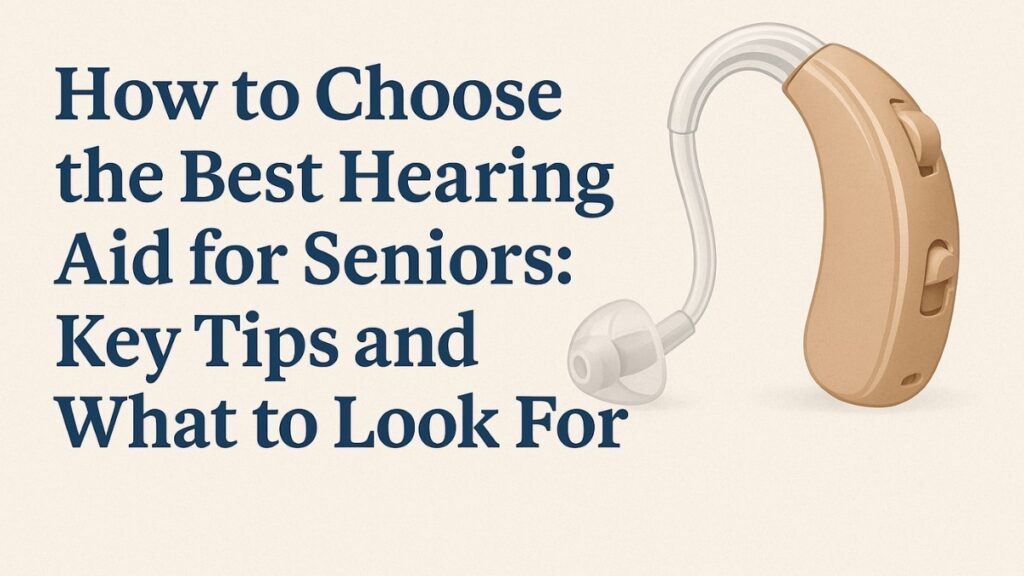
How to Choose the Best Hearing Aid for Seniors: Key Tips and What to Look For
Hearing loss is a prevalent concern among seniors, significantly affecting their quality of life. It can lead to challenges in communication, social isolation, and difficulties in daily activities. Selecting the right hearing aid is crucial to addressing these issues effectively. With numerous options available, understanding how to choose the best hearing aid for seniors becomes essential.
This guide aims to simplify the selection process by providing clear information on the types of hearing aids available, factors to consider when choosing one, and maintenance tips. By the end of this article, you’ll be better equipped to make an informed decision that suits your hearing needs and lifestyle.
Understanding Age-Related Hearing Loss
- Definition: Presbycusis is the gradual decline in hearing ability associated with ageing, typically affecting both ears equally.
Common Symptoms:
- Difficulty hearing high-pitched sounds
- Trouble understanding speech, especially in noisy environments.
- The perception that others are mumbling.
- Needing to increase the volume of electronic devices.
Impact on Daily Life:
- Challenges in communication.
- Social withdrawal and feelings of isolation.
- Difficulty performing routine tasks.
Importance of Early Detection:
- Regular hearing assessments are crucial for early identification.
- Early intervention can mitigate adverse effects on quality of life.
Recognizing these aspects of presbycusis is essential for timely management and maintaining overall well-being.
Types of Hearing Aids Suitable for Seniors
Choosing the correct type of hearing aid depends on the degree of hearing loss, lifestyle, and personal preferences. Here are the common types:
Behind-The-Ear (BTE) Hearing Aids
Description: BTE hearing aids rest behind the ear and connect to an earmold or earpiece inside the ear canal.
Advantages:
- Suitable for various degrees of hearing loss.
- Easy to handle and adjust.
- Longer battery life.
Considerations:
- More visible than other types.
- It can pick up wind noise.
Completely-In-Canal (CIC) Hearing Aids
Description: CIC hearing aids are custom-made to fit entirely within the ear canal, making them less visible.
Advantages:
- Discreet appearance.
- Less wind noise interference.
Considerations:
- Smaller sizes can be challenging to handle.
- Limited battery life.
- Not suitable for severe hearing loss.
Receiver-In-Canal (RIC) Hearing Aids
Description: RIC hearing aids have a behind-the-ear component connected by a thin wire to a receiver placed in the ear canal.
Advantages:
- Comfortable and discreet.
- Natural sound quality.
- Suitable for mild to severe hearing loss.
Considerations:
- Receivers can be susceptible to moisture damage.
- Regular maintenance is required.
Factors to Consider When Choosing a Hearing Aid
Selecting the right hearing aid involves evaluating several factors:
Degree of Hearing Loss
A professional hearing assessment will determine the severity of hearing loss, guiding the choice of an appropriate hearing aid.
Lifestyle and Daily Activities
Consider environments where the hearing aid will be used, such as quiet settings, social gatherings, or outdoor activities, to determine necessary features like noise reduction.
Comfort and Fit
Comfort is crucial for regular use. Trying different styles and sizes ensures the hearing aid fits well and feels comfortable.
Technology and Features
Modern hearing aids offer various features:
- Bluetooth Connectivity: Allows wireless connection to devices like smartphones and TVs.
- Rechargeable Batteries: Eliminate the need for regular battery replacements.
- Directional Microphones: Enhance the ability to focus on specific sounds.
Budget Considerations
Hearing aid prices vary widely. In India, basic models may start around ₹5,000, while advanced models can go up to ₹7,00,000. It’s important to balance cost with necessary features. Certain insurance plans may help cover a portion of the cost.
Importance of Professional Consultation
Consulting with an audiologist is essential to ensure the selected hearing aid meets individual needs. Audiologists provide:
Comprehensive Hearing Assessments:
- Conduct thorough evaluations to determine the type and severity of hearing loss.
- Identify any underlying medical conditions that may require attention.
Personalized Hearing Aid Selection:
- Recommend hearing aid models that align with the patient’s specific hearing loss profile and lifestyle.
- Discuss the pros and cons of various hearing aid options.
Custom Fitting and Programming:
- Ensure hearing aids are properly fitted for comfort and optimal performance.
- Adjust device settings to match individual hearing requirements.
Education and Counseling:
- Guide the correct use and maintenance of hearing aids.
- Offer strategies for effective communication and adaptation to hearing aids.
Ongoing Support and Follow-Up Care:
- Schedule regular check-ups to monitor hearing aid functionality and make necessary adjustments.
- Address any concerns or issues that arise during the adaptation period.
Engaging with an audiologist ensures that individuals receive professional expertise and support, leading to improved hearing outcomes and enhanced quality of life.
Hearing Aid Care and Maintenance
Proper Hearing Aid Care and Maintenance helps your device last longer and work better. Here are a few simple tips:
- Clean Daily: Wipe with a soft, dry cloth to remove earwax and dust.
- Store Safely: Keep in a dry, cool place—use a dehumidifying case if possible.
- Avoid Moisture: Don’t wear them while showering, swimming, or in the rain.
- Battery Tips: Open the battery door at night or charge fully if rechargeable.
- Regular Check-Ups: Visit your audiologist for cleaning and adjustments.
Following these steps keeps your hearing aids in good condition and ensures clear sound every day.
Conclusion
Selecting the appropriate hearing aid is a pivotal decision for seniors experiencing hearing loss, as it profoundly influences their quality of life. This guide has provided an overview of age-related hearing loss, explored various hearing aid types, and discussed essential factors to consider during the selection process. By consulting with audiologists, evaluating personal needs and preferences, and understanding the available options, seniors can make informed choices that enhance their hearing and overall well-being. Proper maintenance and regular professional support further ensure the longevity and effectiveness of the chosen hearing aid, enabling seniors to engage more fully in daily activities and social interactions.
Frequently Asked Questions
If you frequently ask others to repeat themselves, have difficulty following conversations, especially in noisy environments, or need to increase the volume on electronic devices, it may be time to consult an audiologist for a hearing assessment.
Yes, there are hearing aids available to suit various budgets. Basic analogue models start around ₹5,000, while more advanced digital models can be more expensive. It’s essential to choose a hearing aid that meets your specific needs and consult with a professional to find the best option within your budget.
BTE (Behind-The-Ear) hearing aids sit behind the ear and are connected to an earmold inside the ear, suitable for various degrees of hearing loss. RIC (Receiver-In-Canal) hearing aids also sit behind the ear but have the receiver placed directly in the ear canal, offering a more discreet appearance and natural sound quality.
When selecting a hearing aid, seniors should consider features that align with their lifestyle and hearing needs. Essential features may include directional microphones for better understanding in noisy environments, telecoils for improved phone conversations, and automatic volume control. Additionally, features like Bluetooth connectivity can enhance the user experience by allowing seamless connection to various devices.
The adjustment period for new hearing aids varies among individuals. Generally, it can take a few weeks to several months to become fully accustomed to the device. Consistent use, patience, and regular follow-ups with an audiologist can facilitate a smoother transition.
Dr. Harshi, is an accomplished Audiologist with extensive expertise in treating individuals with hearing impairments.

